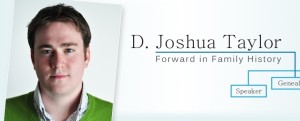 I’m a professional organizer and I routinely give time-management advice to my clients who want it. But, as regular readers of this blog know, managing my genealogy research time is a work in progress for me. I struggle with staying focused, knowing what to work on and combating overwhelm.
I’m a professional organizer and I routinely give time-management advice to my clients who want it. But, as regular readers of this blog know, managing my genealogy research time is a work in progress for me. I struggle with staying focused, knowing what to work on and combating overwhelm.
That changed a little on Saturday. I was fortunate to be in the audience at the Genealogy Society of Southern Illinois’s annual conference. The speaker was D. Joshua Taylor, professional genealogist and truly organized person. Joshua has been doing genealogy research since he was 10 years old and had his first professional clients while he was in high school. He is the president of the Federation of Genealogical Societies and the director of family history for FindMyPast.com. He is paid to do genealogy research for others, but he still works on his own genealogy research on a regular basis.
Joshua gave four talks at the GSSI conference, all of them terrific. He’s clearly a very thorough researcher; I was very impressed with the tenacity that came through in his talks. He leaves no stone unturned in his research.
While all four talks were really valuable, one talk that really blew me away. It was The Modern Genealogist: Timesaving Tips for Every Researcher, in which he outlined how he stays happy and focused while exploring his roots. Here were my big takeaways:
- He works on only 1 to 3 projects/problems at a time, along 3 to 5 extended projects (brick walls).
- If he comes across something else he wants to check out, he just adds it to his project list to work on in the future. (The discipline of that amazes me.)
- For each research project, he sets a manageable goal and commits to a finished product, putting the research into some sort of meaningful form. I love that he knows what success looks like, in advance.
- He plans each research session before he starts.
- He writes a mini-research report for each research session, even when he’s doing it for his own research.
- He reviews his research log every month or two to see what he’s missed and what he can apply to other families.
One benefit to working on just a few projects at a time, he said, is that you have a fighting chance of completing them. “I would rather leave behind 3 to 5 completed projects than 50 started, but not completed, projects,” he said. I was impressed that such a young man (I think he’s about 30, if that) thinks about his legacy–that’s probably a byproduct of being a genealogist, isn’t it?
When I got home from the conference, I immediately identified the three projects I’m allowing myself to focus on at this time. It’s been absolutely liberating–I don’t have to try to figure out what to work, which makes it much easier to get started. I will keep you posted how this all plays out, but I’m feeling very good about following Joshua’s excellent advice.
One other mind-blowing revelation at the conference was that Joshua and I are cousins. I’m going to repeat that, because it’s so amazing. Joshua and I are cousins. Our common ancestors are my third great grandparents, Joseph Price (1820-1904) and Mary Puffenbarger (1823-1896). (It’s Mary’s grave that I used aluminum foil to read in my blog post Reading hard-to-read gravestones.) How did I discover that? Like many good genealogy lecturers, Joshua used his own research in examples. In his very first talk of the day, he mentioned Joseph and Mary, much to my excitement. Joseph Price is one of Joshua’s brick walls, so it’s conceivable that I might, at some point, be able to give him a hand. That would be a dream come true!
